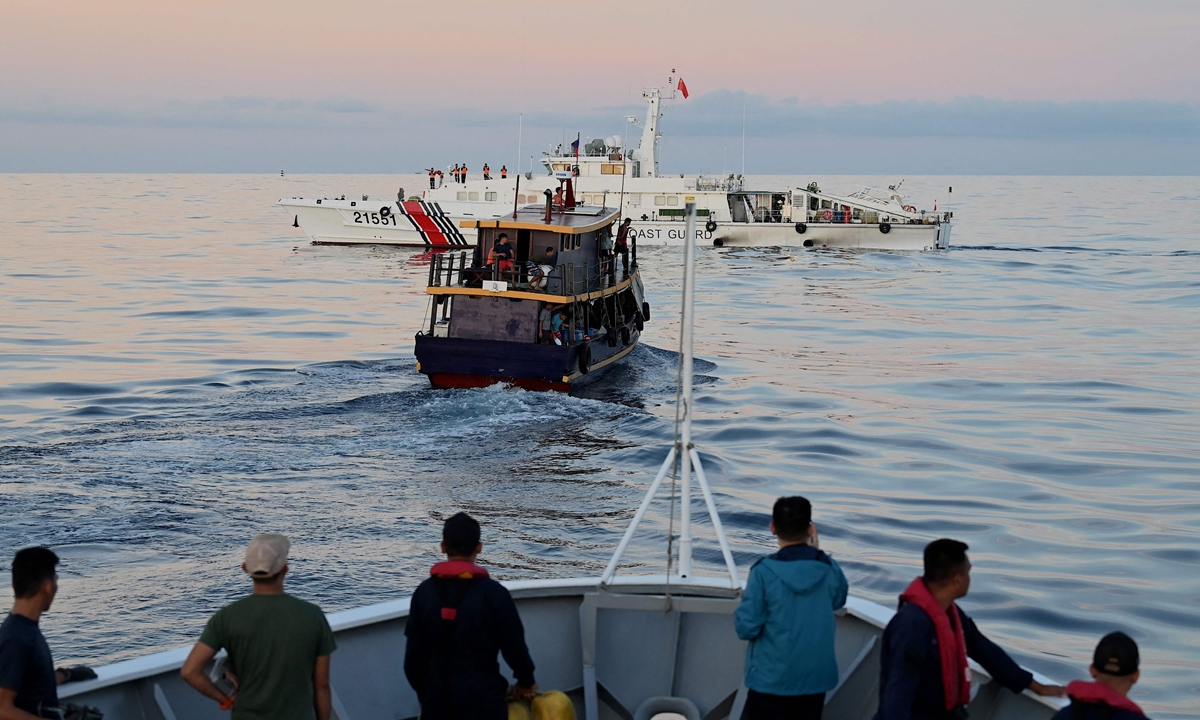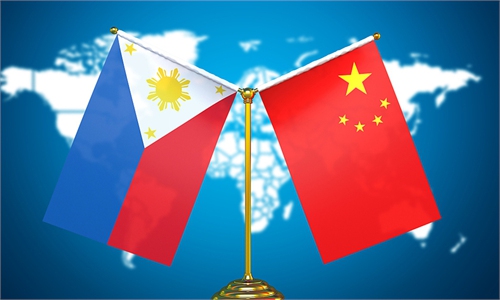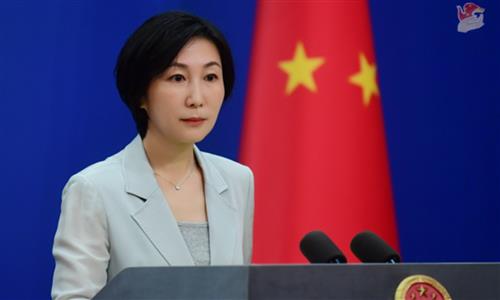Philippine govt scapegoats former commander for reaching new agreement with China on disputes, triggering wide discontent and insider revelations

China urges some Philippines ships to immediately cease its infringing actions on November 10, 2023. Two small Philippine transport ships and three Philippine Coast Guard ships illegally entered the area on that day without China's permission. Photo: Visual News
Efforts to de-escalate tensions between China and the Philippines in the South China Sea by agreeing to a "new model" for resupply missions concerning Ren'ai Jiao (also known as Ren'ai Reef) have forced Philippines' vice admiral Alberto Carlos, the commander of the AFP Western Command (Wescom), to leave the post and get replaced quickly. Observers considered him to be a scapegoat, as the Filipino senior military officials who authorized him to sit at the negotiating table all denied their involvement, leading to a huge domestic controversy and triggering more insider revelations.Experts said this reflects the Philippine government's untrustworthiness and discredits Philippine military, leading to a crisis of public trust.
At the same time, amid the Philippines' recent provocations in the South China Sea and mounting tensions with China, Philippine President Ferdinand Marcos Jr said on Saturday that his country will "vigorously defend what is ours."
Chinese and Philippine observers are calling for the de-escalation of the situation, urging Manila to cherish the peace agreement that has been hard-won with China.
A scapegoat?
Carlos who approved a "new model" for managing the BRP Sierra Madre issue with China has been relieved of his post as commander of the military's Wescom, local media reported on Sunday, noting Carlos has now been officially replaced by Rear Admiral Alfonso Torres Jr.
The military said in a statement the move was part of "ongoing changes in leadership and key positions within the military which is necessary for the institution to adapt to evolving security environment and effectively address emerging challenges."
The decision came after a transcript of the supposed recording of a phone call between the Chinese side and the Carlos on January 3 was revealed in recent days.
However, the Philippine Defense Secretary Gilberto Teodoro and National Security Adviser Secretary Eduardo Ano have denied there was such an arrangement. Ano called the agreement "absolutely absurd, ludicrous, and preposterous," while emphasizing in a statement on May 5 that President Marcos did not empower nor authorize anyone in the Philippine government to enter into or commit to any agreement, understanding, or arrangement - more so informal ones.
After that, Carlos' post was in jeopardy, with critics in the Philippines bringing up his past experience studying in China, questioning his "special relationship" with China.
Passing the buck
At the regular press meeting on May 6, the spokesperson of the Chinese Foreign Ministry again clarified the fact that early this year, the Chinese side and the Philippine side agreed on a "new model" for resupply missions concerning Ren'ai Jiao after multiple rounds of discussions through the diplomatic channel and AFP Wescom. The Philippine military has made repeated confirmation that the "new model" has been approved by all key officials in the Philippine chain of command, including the Secretary of National Defense and the National Security Advisor. On February 2, the Philippines carried out one resupply mission under this "new model" before abandoning it as well.
Carlos assumed command of Wescom in January 2022, and he was supposed to retire in December 2024, according to Philippine media reports.
The Philippine military's "passing the buck" has sparked dissatisfaction among many local figures. They have come out to support Carlos and expose further details.
In a recent column published in Manila Times, Francisco Tatad, a Filipino journalist and politician, cited his source saying that "it was specifically Secretary Ano, who spoke to Teodoro and President Marcos Jr about the Chinese proposal and gave Carlos the go-ahead to talk to" Chinese side.
This comes aligned with a source who previously told the Global Times that Carlos confirmed to the Chinese diplomat during the conversation that both the Philippine Defense Secretary Gilberto Teodoro and National Security Adviser Secretary Eduardo Ano approved the proposal for the "new model" of cooperation.
Tatad further revealed by citing his source that in one conversation between a top Philippine defense official and a top US diplomat, the former was asked, "Why are you talking to the Chinese?" The defense official reportedly denied any knowledge of it and promptly turned the heat on Carlos. "A very strong message was sent to Carlos, who still has over a year in active service, suggesting that he should retire. So, for following the orders of his superiors to the letter, he now has to be sacrificed. Why?"
"The agreement with an overarching aim of mitigating and de-escalating tensions in the area, in my view, represents a prudent step for both parties to prevent escalation and promote diplomatic stability. Ensuring smooth resupply missions, free from confrontations, is crucial for regional peace, stability and security. Why then would the Marcos administration deny this? The intention behind this new model agreement is genuinely beneficial for both sides. Could it be that the Americans are unhappy with it?" questioned Anna Rosario Malindog-Uy, director and vice president for external affairs of the Asian Century Philippines Strategic Studies Institute, in an interview with the Global Times on Sunday.
Malindog-Uy believes Philippine officials' statements over the issue are conflicting and further complicate this issue. "Their reactions, marked by swift denials, seem to betray a certain level of anxiety. This inconsistency is particularly perplexing. The accusation against China engaging in wiretapping implies the acknowledgment of the existence of an audio recording and the authenticity of the transcript. Conversely, other Philippine government officials, including the AFP, assert that the transcript is 'deeply fake.'"
Retired Brigadier General Orlando E. De Leon, former deputy commander of the Western Mindanao Command, recently posted some views shared by soldiers about the matter on Facebook. He believes Teodoro and Año should resign as "they are fomenting a culture of distrust between seniors and subordinates."
"I dont think Caloy (Carlos) will lie re approval /prior knowledge of his superiors— he's not dumb and knew it's way above his paygrade to talk directly to the Chinese without the full knowledge and go signal of his superiors... He confirmed multiple times in the call that his bosses were aware and he's just representing them re the deal."
"For such a significant, serious, and sensitive meeting, the senior Filipino officials indeed denied it with ridiculous reasons and pushed Carlos out to 'take the blame,' which is nothing but a form of 'self-sabotage,'" Ding Duo, deputy director of the Institute of Maritime Law and Policy at the China Institute for South China Sea Studies, told the Global Times. "This kind of meeting represents the Philippine government rather than individuals; the decision-making must have been instructed and reported step by step. It is basically impossible for the Philippine president, as the highest commander of the Philippine military, to be unaware of this."
"It appears he (Carlos) became the scapegoat for the government officials who should be held accountable for shedding light on this matter by providing an honest, straightforward and accurate explanation … [it] highlights broader issues of accountability and transparency within the current government," Malindog-Uy said.
"Furthermore, one must not forget that trust, good reputation and honoring agreements, big or small, are the bedrock and foundational principles of international relations," she stressed.
Ding said the incident has exposed that the Philippine government's casual attitude toward serious diplomatic agreement. This also reflects the lack of political foresight and responsibility among senior Philippine officials around the issue.
Rommel Banlaoi, the president of Philippine Society for International Security Studies, expressed his disappointment over the issue to the Global Times. "Bureaucratic politics and personal conflicts are at play in the current situation, which is damaging Philippines-China relations. Officials need to clarify things to avoid aggravating the already worsening problem. But whether there was a gentlemen's agreement or none, it must be viewed positively as a way to manage differences and avoid military conflicts between China and the Philippines arising from the South China Sea disputes. We should focus the issue on the peaceful settlement of disputes and not on escalating the tension," said Banloi.




